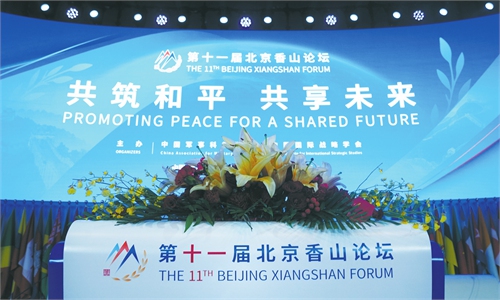
Illustration: VCG
In April 2022, President Xi Jinping proposed the Global Security Initiative (GSI) at the Boao Forum for Asia, offering Chinese wisdom, solutions and strength to address global security challenges, bridge the peace deficit and promote shared security worldwide. Over the past two years, the GSI has served as an important public good contributed by China to global security. It has played a positive role, garnered widespread support, demonstrated significant contemporary relevance and practical impact, and continues to benefit the noble cause of human peace and development.China's proposal responds to call for peace
The GSI directly addresses the urgent question of how to maintain peace and prevent war in today's world. Looking around the globe, it is evident that the world is neither peaceful nor stable. Traditional and non-traditional security threats, such as regional conflicts, arms races, terrorism and climate change, are intertwined. At this crossroads, the world must unite and take actions today to shape a better future for tomorrow.
In the face of a deteriorating international security environment and increasing global contradictions, some countries remain entrenched in "arrogance and prejudice," indulge in "bullying and coercion," push for "decoupling" and act unilaterally under the guise of multilateralism. They exploit the term "rules" while violating them and claim to prioritize "security" while causing insecurity. Such actions seriously undermine the international security order. Finding an effective security solution in this changing and turbulent world has become a pressing concern for all.
Global security governance urgently needs to break free from "outdated mind-sets" and seek "new pathways." The GSI stands at the forefront of this era of transformation, offering a significant security concept and a set of principles to resolve conflicts, manage risks and address security deficits. Amid global turmoil, the GSI highlights China's commitment by providing new ideas and solutions that bring fresh momentum and hope for world peace and security.
China's vision reflects the pursuit of justice
At the core of the GSI are the six commitments: stay committed to the vision of common, comprehensive, cooperative and sustainable security; stay committed to respecting the sovereignty and territorial integrity of all countries; stay committed to abiding by the purposes and principles of the UN Charter; stay committed to taking the legitimate security concerns of all countries seriously; stay committed to peacefully resolving differences and disputes between countries through dialogue and consultation; and stay committed to maintaining security in both traditional and non-traditional domains.
These six commitments embody the diplomatic approach of a major Eastern nation that considers the future of humanity and prioritizes the well-being of all people.
First, China pursues common security rather than only caring about its own security. In today's era, no country can ensure its own security in isolation from global security, and no real security can be built on the insecurity of others. The GSI calls for respecting and safeguarding the security of every nation, emphasizing the universal, equal and inclusive nature of security.
Second, China pursues comprehensive security rather than security of a certain region. Pursing comprehensive security means to view regional and country-to-country security issues at a global level, recognizing the interconnectedness of various security challenges and working to resolve both current prominent issues and potential threats. This approach maximizes the overall effectiveness of global security governance.
Third, China pursues cooperative security rather than alliance-exclusive security. Under the guise of so-called allies and friends, the US is reviving Cold War tactics, disturbing global peace. In contrast, cooperative security emphasizes that countries should not form exclusive alliances to maintain national security.
Fourth, China pursues sustainable security rather than short-term security. In the traditional Western paradigm of geopolitical security thinking, countries pursuing their own security have paradoxically led to greater insecurity, creating a common dilemma in international relations. Stability, sustainability and predictable security seem to be out of reach.
China is actively promoting security cooperation
China is not only an active proponent of the GSI but also a steadfast practitioner. Over the past two years, China, along with all parties involved, actively promotes the CSI to achieve fruitful results, showcasing its vibrant vitality.
Since the GSI was proposed, China has joined hands with other countries and international organizations to steadily advance security cooperation within the initiative's framework, achieving a series of significant preliminary outcomes. The GSI's appeal and influence continue to grow. With the support of over 100 countries and international and regional organizations, it has been incorporated into numerous bilateral and multilateral cooperation documents between China and other countries, forming a global consensus. The increasing international response to the GSI can be attributed to its resonance with the global community's desire for peace, development and stability. It unites countries from diverse cultural backgrounds and stages of development, promoting cooperative security through solidarity.
Under the GSI, China has developed an approach with Chinese characteristics to address hotspot issues. The GSI confronts problems and challenges head-on, upholding justice and fairness to seek peaceful solutions for countries troubled by war and conflicts. Regarding the Ukraine crisis, China released a paper outlining its position on the political settlement of the Ukraine crisis, actively engaging in shuttle diplomacy and urging peace talks. Additionally, China facilitated the reconciliation between Saudi Arabia and Iran, initiating a "wave of reconciliation" across the Middle East. Under China's efforts, Palestinian factions signed the Beijing Declaration to end division and strengthen Palestinian national unity. China has played a constructive role in resolving some of the world's most challenging regional conflicts, bringing certainty and positive energy to a world filled with turmoil.
The GSI actively leads global security governance in emerging fields, reflecting the interests of developing countries and raising a strong call for cooperation in addressing new security challenges. In the field of data security, China proposed the Global Initiative on Data Security, striving to build a global data security governance system. In artificial intelligence, China introduced the Global Artificial Intelligence Governance Initiative, offering new solutions to AI governance challenges.
The path of righteousness is never lonely; collective efforts can go far. Over the past two years, China and various parties have worked together to safeguard global security, demonstrating commitment and responsibility through tangible results. Looking ahead, China will continue to work with various parties to push the GSI toward a brighter future, ensuring shared security and prosperity for the people of the world.
The author is the vice president of the China Institutes of Contemporary International Relations. opinion@globaltimes.com.cn



